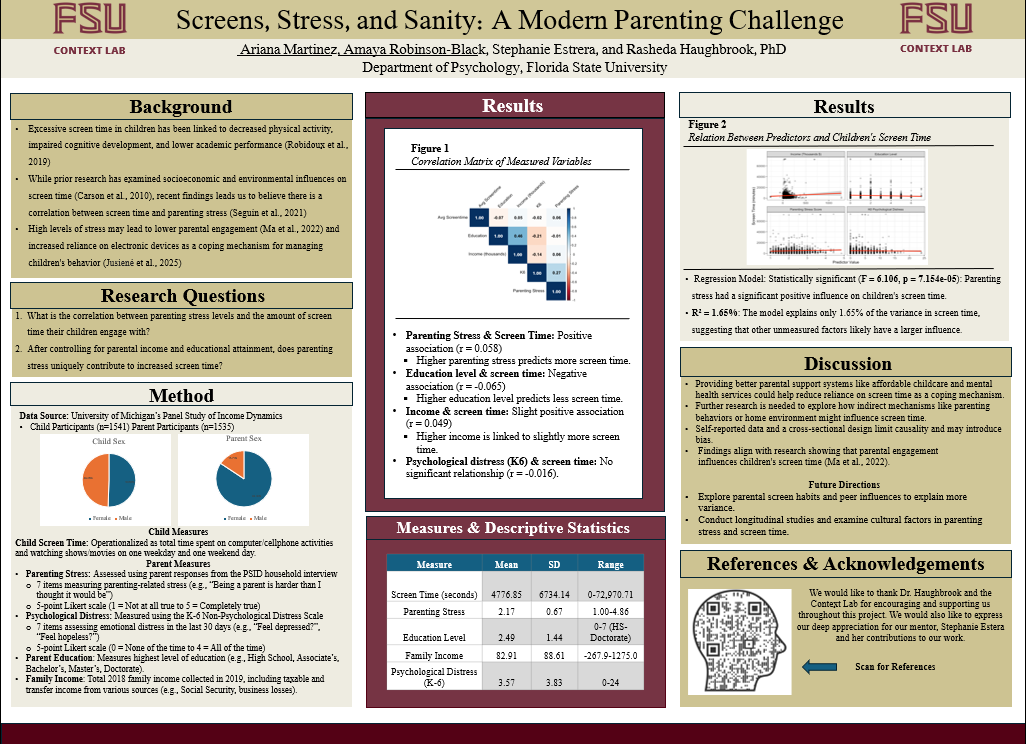Research Symposium
25th annual Undergraduate Research Symposium, April 1, 2025
Amaya Robinson-Black Poster Session 2: 10:45 am - 11:45 am/ Poster #22

BIO
I am an experienced youth development professional with a background in psychology, offering expertise in child safety, educational programming, and research-based approaches to supporting young people. As a Student Researcher in Dr. Haughbrook's Context Lab at FSU, I analyze environmental factors that influence child development and applying these insights to my practical work with youth as an After-school Counselor at Florida State University Schools. Outside of academic and professional development, I serve as the Director of Sites for Jewels INC., a mentoring organization at FSU, where I coordinate mentorship with public schools in the Leon County School District. In addition, I mentor at Amos P. Godby High School, facilitating positive decision-making skills and implementing college readiness initiatives tailored to individual student needs. My commitment lies in creating nurturing environments where children can thrive through the application of psychology principles, dedicated attention to individual needs, and strong organizational capabilities.
Screen, Stress, and Sanity: A Modern Parenting Struggle
Authors: Amaya Robinson-Black, Stephanie EstreraStudent Major: Psychology
Mentor: Stephanie Estrera
Mentor's Department: Psychology Mentor's College: College of Art's and Sciences Co-Presenters: Ariana Martinez
Abstract
This study investigates the relationship between parental stress levels and children's screen time, extending beyond previously established socioeconomic and environmental factors.While research has documented links between excessive screen time and negative developmental outcomes in children, the specific contribution of parenting stress remains underexplored.Using data from the University of Michigan's Panel Study of Income Dynamics, we analyzed responses from 1,541 children and 1,535 parents to examine correlations between parenting stress and children's screen time, while controlling for parental education and income.Screen time was operationalized as total time spent on devices and viewing media on both weekdays and weekends. Parenting stress was assessed using a validated 7-item measure on a 5-point Likert scale. Results revealed a positive association between parenting stress and children's screen time (r = 0.058), indicating that higher stress levels predict increased screen usage. A negative association emerged between parental education and screen time (r = -0.065), while income showed a slight positive relationship (r = 0.049). Regression analysis confirmed parenting stress as a significant predictor of screen time (F = 6.106, p < 0.0001), though the model accounted for only 1.65% of variance, suggesting other unmeasured factors play substantial roles.These findings align with emerging research indicating parental engagement influences children's screen time habits. Results highlight the need for better parental support systems, including affordable childcare and mental health services, to reduce reliance on electronic devices as behavioral management tools.Future research should incorporate longitudinal designs, assess parental screen habits, and examine cultural factors to better understand this complex relationship.
Keywords: Stress, Child Development, Screens, Parenting


